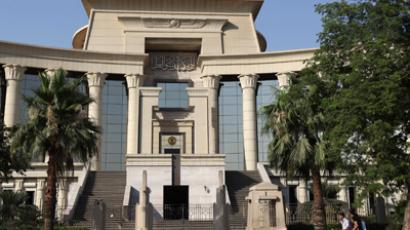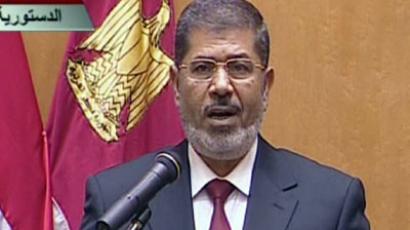'Egyptian military may rearrange foreign-backed coup against Morsi'
Egyptian President Mohammed Morsi has taken the bold step of sacking two of the country’s top military commanders from their governing posts. With Cairo facing dire financial straits, however, such a brazen move may eventually spur a military coup.
On Sunday, President Morsi fired Defense Minister Field Marshal Mohammed Hussein Tantawi, his predecessor as the country’s head of state, and Egypt’s chief of staff, Lieutenant General Sami Anan. Morsi also announced that the constitutional amendments that transferred some of the president’s powers to the Supreme Council of the Armed Forces (SCAF) would be annulled. Nevertheless, both Tantawi and Anan are to remain advisors to the president.The move is seen as the latest step in the long-term struggle between the military and the Muslim Brotherhood in post-Mubarak Egypt. While the Muslim Brotherhood won a plurality of seats in the country’s parliament, the country’s military-backed Supreme Constitutional Court of Egypt declared the results of the elections to be void, and dismissed the parliament. However, in July, the parliament’s powers were reinstated by Egypt’s new president, Mohammed Morsi. Asia Times correspondent Pepe Escobar believes that while the miliary is unlikely to respond to Morsi's latest move, the debt-ridden country may still see a coup in the months to come. RT: Is the sacking of the two generals a sign that the military’s decades-old rule is coming to an end in Egypt?Pepe Escobar: It’s much more complicated than that. The Emir of Qatar went to Cairo. A few hours later, Morsi made his move. What does that tell you? It tells you that, first of all, Morsi got two billion dollars from the Emir of Qatar personally, instead of Morsi going to Mecca and talking to the House of Saud, which is what happened two weeks ago. The Emir of Qatar actually went to Cairo, talked to Morsi, gave him two billion dollars as a starter and immediately afterwards, Morsi made his move, which was a counter-coup following a previous coup against the Muslim Brotherhood.RT:What can we expect from the new defense minister, a former intelligence chief who studied in the US?PE: Basically, the Muslim Brotherhood doesn’t want any more frictions between SCAF and the President. So, we can say that, for the moment, the score between the Muslim Brotherhood and SCAF is 1-0. The problem is that the military controls almost 40 per cent of the Egyptian economy even with the junta realigned and rearranged. Egypt is broke, it has no money. They have an annual deficit of 36 billion dollars.So these two billion dollars from Qatar is a little bit of help, but not much, because there’s been no tourism in Egypt for months now, whereas before they used to get five to seven billion dollars per year from tourism. They have five billion dollars from renting the Suez Canal, and they have about four or five billion dollars from Egyptian workers. They still have this enormous gap. Where is the money coming from? Qatar cannot pay for Egypt’s debt indefinitely. The House of Saud is horrified; when Morsi asked for money from the House of Saud two weeks ago, they said that they will study the situation. Now Qatar is stepping in. This means that the Muslim Brotherhood and Morsi as president are extremely powerful against a rearranged and weakened junta. The junta doesn’t have a response for the moment, so I’m betting that in the long run that they will let Egypt to collapse by practically defaulting and being unable to pay its debts. And then, maybe later, they’ll rearrange another military coup.RT: Is the dismissed generals’ new role as advisors just an attempt to save face?PE: Yes, this is totally cosmetic, like the medal of honour, or savior of the nation. This is just rhetoric and medals. We should expect something to happen, but not immediately in terms of a counter-coup by SCAF. Because the junta is still there, even Morsi voided their constitutional prerogatives they had taken away from the President. They may still have some cards to play, and don’t forget, very good relationships with the Pentagon. I’m sure a lot of people in Washington are horrified about Morsi’s move. Israel is totally freaking out with Morsi’s move because now they say that Egypt has become an Islamic dictatorship. So there could be some counter-coups from foreign actors.RT: Do you think we will see new clashes between supporters of the Muslim Brotherhood and the military?PE: Yes, absolutely. I was talking to a very good Egyptian writer and journalist yesterday, and he explained to me that the Muslim Brotherhood is, basically, not widely popular in Egypt. They are very well organized; they have four or five different strengths. They managed to organize quickly, they won the elections, but this doesn’t mean that they are popular in the long run. In the long run, if Egypt has more secular political parties, including the people who started the revolution in Tahrir Square, the whole situation will change and the Muslim Brotherhood cannot count on remaining in power indefinitely in Egypt.














